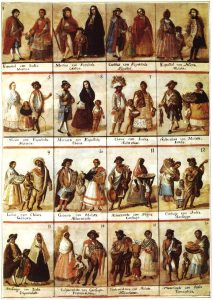Everyday Triggers
Every day I trepidatiously scan the latest news on the internet hoping to avoid the most egregious triggers. This week began with a debate on “white Hispanic” trending in social media regarding a Deputy Sheriff in Los Angeles who shot and killed a Black man. That debate was similar to the “blue dress / gold dress” debate of 2015, with the exception that it was about race, and racism, and death. As a woman who has spent too much of her adult life responding to the statement: “You don’t look Puerto Rican!” Meaning: “You look white,” these debates make me cringe. Yesterday had its share of reports of violence against people of color by law enforcement officials, politicians, and haters-in-general, but one story jumped out at me. “A white professor lied about being Afro-Latina for years.”
Colorization
I spend a great deal of time thinking about the construct of racial and ethnic identity. Throughout history there have been people who chose to pass as white (if they could pass as white) because they sought the privilege provided by passing safety from violence, job opportunities, improved housing conditions, etc. Many mixed-race people do not have to try to pass. Genetics are a funny thing. We do not all carry the same percentage of our ancestors’ DNA. We come out all mixed up. I have siblings with blond hair and blue or grey eyes and siblings with black hair and dark brown eyes. We have a range of skin tones. I was encouraged by my mother to stay out of the sun long before fears of skin cancer were a common concern, as she did not want me to get too brown.
The point of all of this is that we have been taught and conditioned for hundreds of years that there are clear advantages to being white. In recent years, people of color – Africans, descendants of Africans, Asians, descendants of Asians, Native Peoples, descendants of Native Peoples, and every possible combination of the above with varying degrees of European DNA mixed in – have begun to learn to value themselves. The assertion that Black Lives Matter, that people who are not 100% white matter, comes at the price of being attacked by those who disagree (aka racists). Those attacks may be verbal (hate speech): “You dirty spic!” Those attacks may be written (racist billboards) “Diversity = White Genocide!” Those attacks may be physical “The police shot into the crowd of protesters with rubber bullets at point blank range.”
Co-opting Suffering
What this woman, especially as one in the academic sector wielding an incredible sphere of influence, did by impersonating people who are born into a world where those attacks and the threat of those attacks are a daily experience was to disavow the value of our lived experience. I once had a friend who said, “I cannot compete with you!” She was referring to my childhood of poverty and abuse, my first husband being killed in a taxi accident in Beijing, and other personal struggles and tragedies that I have experienced. She also referenced my being a Latina. This ‘icing on the cake’ apparently made it hard for a white woman to complain about how difficult her own life was. This was long before I was facilitating discussions on white privilege in my workshops, but her complaint created a breaking point for me. White, non-Hispanic / non-Latino people cannot even let us have our suffering. They even have to co-opt that! I have survived being spit on, having a full soda can thrown at my head, having a bucket of water with laundry soap thrown in my face, in addition to many verbal racist attacks by people who did not like having dirty spics as neighbors in our public housing projects in Astoria, NY. These are traumas that I would gladly trade for a life of safety and prosperity or privilege.
Every time we are confronted with the assault of a white person passing as a person of color, we are forced to face our internalized racism. The many shades of internalized racism within our own communities that focus on whether someone is being Black enough or Latino enough. The debate over how Hispanic a ‘white Hispanic’ person is versus an ‘Afro-Hispanic’ or ‘Afro-Latino’ causes us to fracture further and further apart. Racism has been part of Latino culture for as long as there have been Latinos (think of the Conquistadors). As we gain self-realization, self-esteem, and work to unlearn the internalized racism that we have been taught for millennia, we must remember that teaching to value shades of color perpetuates the Spanish system of la Casta* which was a very effective way of keeping people divided and disempowered. As long as we focus on shades of color as a value system we perpetuate racism. This perpetuates our division, our separateness, our lack of connection and inclusion, and ultimately our ascendance to full privilege. We have an opportunity to stop reacting to the racism that we have been taught and to start intentionally being who we are: the legacy of those who came before and new, beautiful, and whole people.
Onward!
Wendy Amengual Wark
September 4, 2020
Wendy@InclusionStrategy.com
www.InclusionStrategy.com


